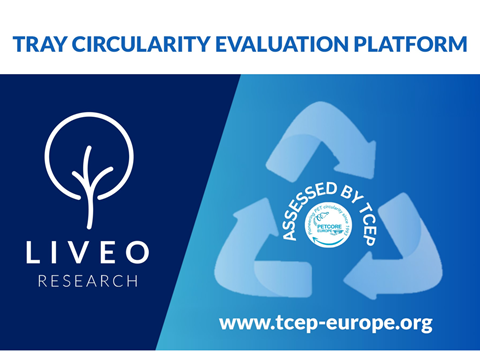
Liveo Research’s One-Material Blister (OMB) made of PET has been certified as recyclable by Petcore Europe’s Tray Circularity Evaluation Platform.
Supported by Plastics Recyclers Europe and the European Association of Plastic Recycling and Recovery Organizations, the Tray Circularity Evaluation Platform seeks recyclability and circularity for thermoformed PET trays. It evaluates existing technologies and innovations, providing independent and confidential assessments of their impact on European PET recycling processes and supporting their value chains.
Liveo Research recently worked alongside Bayer to develop a ‘first-of-its-kind’ PET blister pack for the over-the-counter drug brand Aleve. By eliminating PVC from the design, Liveo believes it has reduced the pack’s carbon footprint by 38%.
The OMB constitutes a base film and lidding film made from PET. It is designed to minimize the pack’s complexity and improve its recyclability, since the two components do not need to be separated before the pack is recycled.
‘Extensive’ testing has apparently revealed that the recovered material can be reused in ‘high-quality’ products with mechanical and optical properties compared to virgin PET.
“We are very pleased with this result for our successful OMB in PET,” says Dr. Carsten Heldmann, CEO of Liveo Research. “The certification was determined by a renowned independent body in a series of demanding tests under real-life conditions.
“This is a decisive milestone for Liveo Research AG, providing clear evidence that this innovative product supports circular economic principles and advances sustainable practices.”
Chris Padain, vice president and head of Design and Packaging at Bayer’s Consumer Health Division, recently spoke to Packaging Europe about its PET blister packaging solution. He discussed the challenges involved in adapting this mono-material solution to the healthcare industry’s regulatory requirements and envisioned a future where an all-PE blister pack could replace traditional PVC alternatives.
Bayer is also working with PAPACKS to package consumer health brands like Aspirin, Bepanthen, and Claritin in fibre-based packaging using moulded pulp technology and a plant-based coating. The move is set to contribute towards its goal of achieving 100% reusable or recycle-ready packaging by 2030.
In other news, Henkel recently won a Sustainability Award for recycling PET blisters and trays into a 100% PCR PET film for the blister pack applied to its WCFrisch ProNature WC cleaning product. The film is said to contain over 80% recycled PET tray, all of which is sourced from German household waste.
If you liked this story, you might also enjoy:
The ultimate guide to the Packaging and Packaging Waste Regulation in 2024
How are the top brands progressing on packaging sustainability?
Sustainable Innovation Report 2024: Current trends and future priorities
Everything you need to know about global plastic sustainability regulation














No comments yet